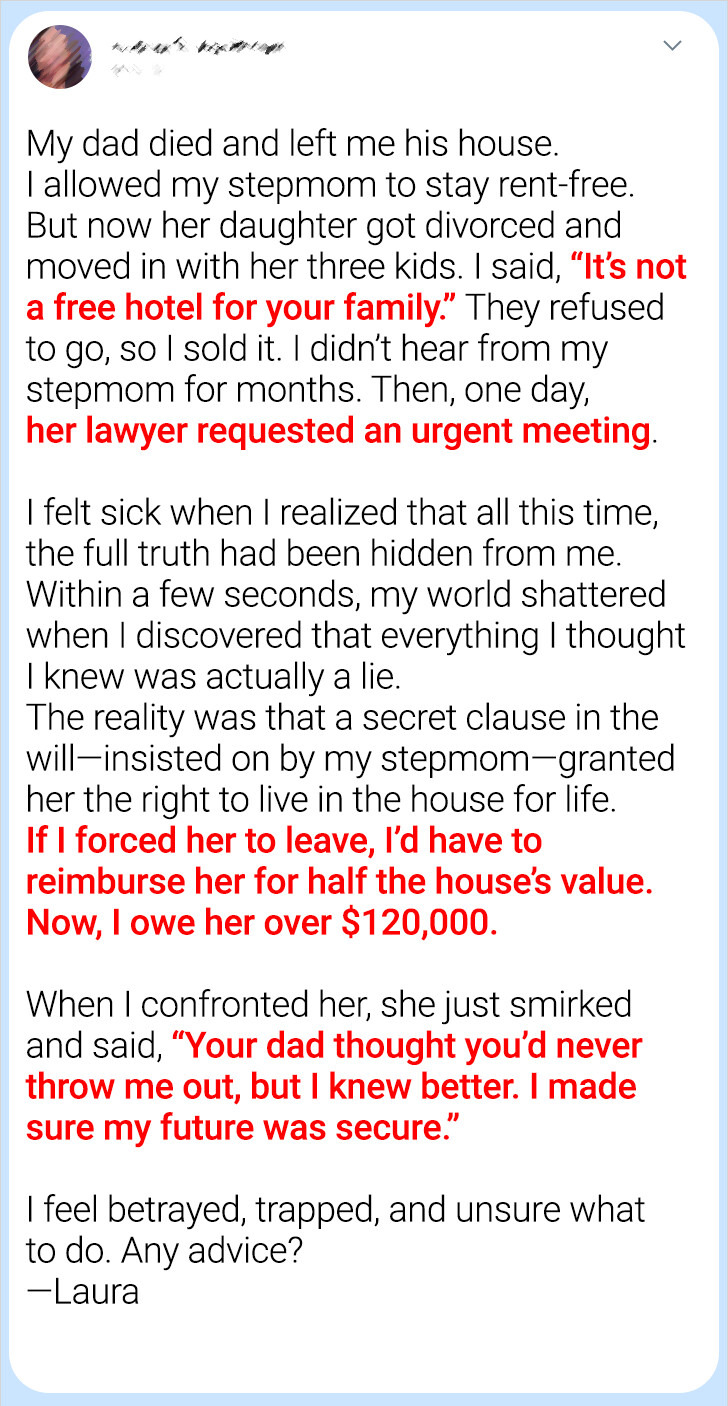Nobody betrayed you. You wanted power you didn't have, chose to exercise that illegitimate power without seeking legal counsel, and so you get to find out the costs of your power play. The life estate is standard practice in situations where one spouse wants to leave the house to his/her children, but also wants the surviving spouse to be able to stay in the marital home for as long as s/he chooses to do so. The life estate provision would not have been "hidden" in the will, but would have been discussed by the attorney handling the estate, and would have been clearing spelled out in the documents closing the estate. The only one betrayed here is your father, who trusted you to be a better person than you are. You proved your stepmother right.
I Threw My Stepmom Out of My Dad’s House — It’s Not a Free Hotel

Money often has the potential to create tension within families, as Laura experienced firsthand. She discovered that her stepmother’s daughter and grandchildren had moved into the house she inherited from her late father. When they refused to leave, Laura felt she had no choice but to sell the property. However, an unexpected twist in the situation left her completely shocked. Seeking guidance, Laura reached out to us for advice.
Here is Laura’s letter:

Thank you for trusting us with your story, Laura! We’ve compiled some advice to support you as you work through this challenge.
Challenge the validity of the clause.
Hire a specialized estate attorney to carefully review the will, particularly the clause granting your stepmom life rights.
Investigate whether it was added under undue influence or without your father’s full understanding. If there’s any indication that the clause was manipulated or isn’t legally binding, you may have grounds to challenge it. Even if it’s valid, your attorney can help you explore options for reducing your financial liability through negotiation or court mediation.
Focus on emotional accountability.
Confront your stepmom calmly but firmly about her actions and the impact of her betrayal. This isn’t about changing the legal situation but about holding her accountable for her manipulation.
Express your feelings of hurt and betrayal to ensure she understands the personal toll of her decisions. Sometimes, this emotional confrontation can lead to a change of heart, even if it doesn’t alter the financial obligation.
Negotiate a settlement.
Approach your stepmom with a proposal to negotiate the payout. If $120,000 upfront is unaffordable, offer a structured payment plan over several years.
Highlight the costs and delays of pursuing this through legal channels to encourage her to accept a reduced amount or alternative terms. For instance, you could offer a lump sum that’s lower than the full value but settles the matter quickly and avoids further conflict.
Turn the financial setback into an opportunity.
Instead of dwelling on the loss, use this experience as motivation to reevaluate your financial priorities and goals. Consider selling other assets, downsizing, or taking on temporary work to cover the payment while minimizing its long-term impact on your life.
Once you’ve resolved the debt, you can rebuild with the knowledge that you overcame a difficult situation and secured your financial independence.
Louisa, another Bright Side reader, had always dreamed of having her wedding at her father’s house. However, she made the controversial decision to ask her stepmother not to attend. What unfolded on the wedding day, however, was far beyond anything she could have anticipated. Here’s the dramatic and shocking story.
Comments
Ok but SHE moved in FOUR other people!! Your lawyer can get her on that!!
Related Reads
I Pretended to Lose My Stepdaughter’s Puppy, and it Was Worth It

I Refused to Take My Stepdaughter on Our Family Trip

15 Moments That Show Kindness Is Quiet but Changes Everything

15 Success Moments From Strangers That Deserve All the Golden Buzzers in the World

15 Life Moments That Prove Quiet Kindness Is a Real Power Move

18 Pets Who Proved They Understand the World Much Better Than We Think

15 “How We Met” Stories Destined to Become Family Legends

10 Jaw-Dropping Stories Where One Moment Changed Everything

I Won’t Sacrifice My Last Good Years Because My Son Refuses to Grow Up

12 Stories That Prove Real Kindness Is About Actions, Not Words

I Refuse to Let My Sister Get Away Without Repaying My Money, I’m Not Charity

A Stranger Humiliated My Daughter at Disney World—He Picked the Wrong Mom to Mess With




